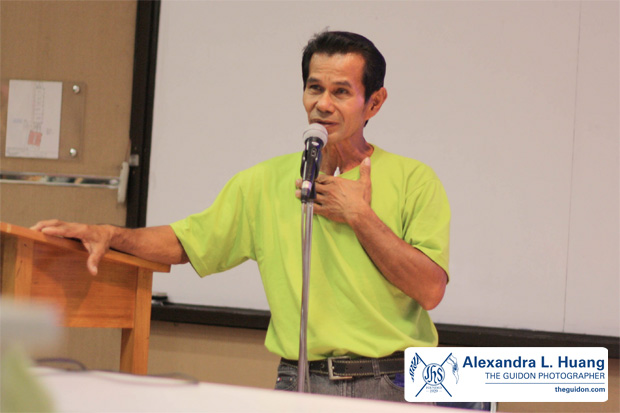
REASSESSING MOVES. Bicolano Ilocano Casiguran Farmers Association President Elmer Gonzales said that the government should take another look at the situation in Casiguran before carrying out plans. Photo by Alexandra L. Huang.
STUDENT POLITICAL Party Christian Union for Socialist and Democratic Advancement (Crusada) held talks in the Ateneo to promote awareness of the Aurora Pacific Economic Zone and Freeport Authority (Apeco) issue.
The most recent talk was held last September 21 at the Ching Tan Room. In the talk, Bicolano Ilocano Casiguran Farmers Association President Elmer Gonzales spoke to Ateneans about the “Underside of Economic Progress,” as manifested in Apeco.
Another talk was also held last August 16, where Gonzales, farmer Aurilio Pascua, Akbayan Youth Representative Randy Cirio, Department of Agrarian Reform lawyer Aison Garcia, and alumnus Hansley Juliano (AB/MA PoS ‘12) and his team, who did extensive research on the issue, were present.
Apeco has displaced more than 3,000 families of farmers, fishermen and the native Dumagat from their land, in order to give way to a freeport.
“Dito [Casiguran] kami nabubuhay, dito kami mamamatay (We live here and we will die here),” said Gonzales in the earlier meeting.
Apeco will transform the areas it covers in Aurora into an industrial, commercial and recreational center with residential areas.
Apeco was made possible by Republic Act No. 9490 or the Aurora Special Economic Zone Act of 2007. Senator Edgardo Angara and Aurora Representative Juan Edgardo Angara authored the bill.
The real issue
The government is claiming 12,923 hectares of land which have long been cultivated by the Casiguran farmers. The area also covers the residence of fishermen who make their living in the area.
Llamanzares said that the real issue is that all of these people “are going to be landless and they’re going to lose their livelihood.”
Ace dela Cruz, a political science major, said that the Apeco issue has been around for so long, yet government efforts to address the concerns have been lacking.
“Despite its promise of promoting the Philippines as one of the economic zones in Asia, we cannot deny the fact that it largely threatens our natural resources and a lot of people by grabbing their lands which these people have been maintaining for decades now,” he added.
Llamanzares said, “There’s so much potential to develop the agriculture there but the problem is with all the agriculture there, not all of them are getting into the city.”
Gonzales said that if the government had really been aiming for the improvement of the affected citizens’ subpar standards of living, then it had taken the wrong solution.
Both Gonzales and Pascua suggested that the government first focus on the area itself and see what can be improved, such as the schools and electricity.
Spread of awareness
Cirio said that the farmers chose to seek help from the Ateneo because they knew that they would be accommodated.
“Napili namin ang Ateneo dahil malapit ang puso naming mga magsasaka sa unibersidad at dahil maraming magsasaka na silang natulungan (We chose the Ateneo because the university is close to our hearts and because they’ve already helped many farmers in the past),” he said.
“One of the major pushes that [the farmers] are going for right now is awareness,” Llamanzares said. “If you think about it, how many people know the issue of Apeco? How many people know what the Casiguran farmers are actually fighting for?”
Llamanzares added that the farmers originally wanted the Ateneo community to send a letter to President Benigno Aquino III. “But in the grand scheme of everything, a letter to him probably wouldn’t achieve the goals they are looking for.”
It’s just really networking… trying to get more people aware about the issue. And hopefully, with more people aware, they have enough support to put a halt to the Apeco [development],” Llamanzares said.
Crossing over to the margins
“Ateneans, for the longest time, have always been seen as the elite of the community,” said Llamanzares. “They’re the ones who end up becoming the managers, leaders and politicians of the future but what type of leaders are we developing if these are leaders that don’t care about the national issues?” He also added that for future leaders from the school to be truly called Atenean, they should look out for their fellow Filipinos and not be too focused on building their careers alone.
“Ateneans are supposed to be men and women for others. But if we can’t even embody that then why do we call ourselves Ateneans?” he said. “That’s why it’s important to cater to these issues because maybe it doesn’t do anything necessary for our career or education, but it does something [in accordance with] the moral standards that they demand from Ateneans.”







